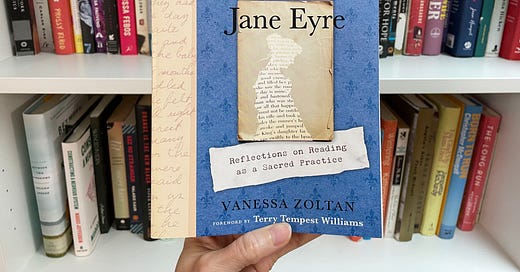Praying with Jane Eyre: Reflections on Reading as a Sacred Practice, by Vanessa Zoltan
On treating books as holy texts
Memoirs with Melissa shares twice monthly reviews intended to expose readers to diverse authors and life experiences. I welcome and value every free subscriber. Paid subscriptions are an extra way to support my work in elevating the canon of human experience. Thank you!
Vanessa Zoltan is an atheist Jewish chaplain whose memoir brought me to my agnostic knees. I heard about Praying with Jane Eyre: Reflections on Reading as a Sacred Practice last fall on NPR’s All Things Considered. When I finally sprang for the audiobook in December, I fell in love.
Zoltan has composed a series of memoiristic essays that read like vital sermons for life. Her guiding text for assembling them comes not from the Torah, but from her own lived experience as the grandchild of four Holocaust survivors paired with Charlotte Brontë’s novel Jane Eyre. The underlying premise of Zoltan’s memoir is that anybody can treat almost any book they love as sacred.
Jane Eyre isn’t inherently holy. In fact, Zoltan warns the novel can be downright racist and patriarchal. What makes it and any other book sacred, in Zoltan’s opinion, is the act of returning to it again and again. As long as a book is generative, meaning two people can read the same passage and interpret it differently, the book is a valid candidate.
Jane Eyre isn’t inherently holy. In fact, Zoltan warns the novel can be downright racist and patriarchal.
Praying with Jane Eyre ended up turning into a sacred book for me. Once I finished the audio version, I felt compelled to read the print edition. The paperback became a palate cleanser as I completed a year of reading 100 books and reflected on what and how I want to read in 2024.
I adored Zoltan’s insights on patriarchy, love, heartbreak, betrayal, mental health, and women’s anger. They made me wonder: what are the stories about love that have been infused into our brains from an early age? Have we been conditioned to desire men like Rochester who is hiding a madwoman in his attic? And since when did we confuse angry with mad?
I also appreciated Zoltan’s opening acknowledgement that her memoir only includes reflections on books by white cisgender authors. Doing otherwise, she felt, would risk appropriation, although she also acknowledges that by not including books by diverse authors, she risks erasure. To compensate, she references several books by creators who are not white and/or cisgender that have inspired her work. As a white cisgender creator myself who aspires to elevate diversity in my work, I admired her process and decision to proceed in a way that feels most ethical for her.
Zoltan gave me much to think about when she wrote “Things that are not perfect can give you blessings not only in spite of their imperfections but because of them.”
A small portion of Zoltan’s memoir includes reflections on the Harry Potter series, whose author J.K. Rowling is notorious for making offensive comments about the transgender community. Zoltan gave me much to think about when she wrote “Things that are not perfect can give you blessings not only in spite of their imperfections but because of them.” I could say the same thing about the holy text of my childhood. She also claims, “Hermione’s lessons help me better protest Rowling.”
So why spend so much time on one book when there are so many to be read that most of us would love to osmosis them into our heads? Having read Zoltan’s memoir twice, I dare you to slow down long enough to answer that question for yourself. I’ll be devoting a portion of my reading time in the coming year to reading deeply and sacredly. As Zoltan preaches in her memoir: “Let’s read too much because otherwise we risk reading too little.”





This book looks intriguing, a clash of outdated 19th century beliefs and twentieth century catastrophes whose root was those mistaken beliefs.
Jane Eyre and her kin (Brontes, Wharton, Austen,Dickens, even Thackery) got me through much of young motherhood. I tend to read books extending forgiveness toward the author for developments they could not have foreseen, but I understand how many younger readers chafe at then contemporary but now outmoded attitudes.
I like your point about reading deeply. Some books deserve a second pass, despite their historical failings, seen in retrospect. Audio can sometimes only convey part of a book, linear as it is, in presentation. The physical book makes mulling over one potent paragraph easier, in my (outdated?)opinion. Thank you for the recommendation.
Adding this one to my queue! It feels important to remember that slow, sacred communion with one book enriches us more than 50, hastily read. Thanks for this, Melissa!